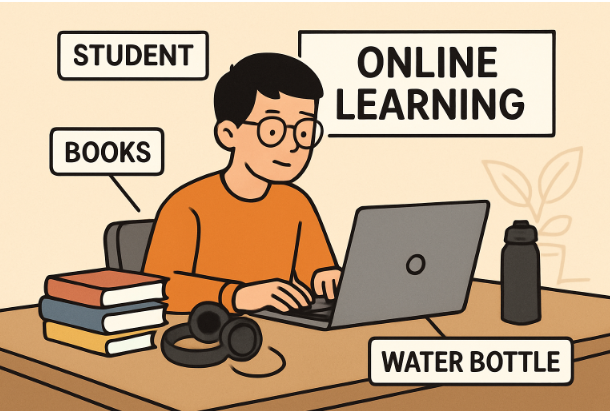Contents
- 1 Key Takeaways
- 2
- 3 Table of Contents
- 4 What Is Virtual School?
- 5 Flexibility and Personalization in Online Education
- 6 Building Strong Study Habits
- 7 Tools and Resources for Online Learners
- 8 Role of Family and Guardians
- 9 Socialization and Community Building
- 10 Real-Life Success Stories
- 11 Conclusion: Key Tips for Thriving in Virtual Schools
Key Takeaways
- Virtual schools offer flexible and personalized approaches to learning.
- Effective time management and self-motivation are crucial for success in online education.
- Strong support networks play a key role in student achievement.
- Practical strategies can make the transition to online learning smoother for students and families.
Table of Contents
- What Is Virtual School?
- Flexibility and Personalization in Online Education
- Building Strong Study Habits
- Tools and Resources for Online Learners
- Role of Family and Guardians
- Socialization and Community Building
- Real-Life Success Stories
- Conclusion: Key Tips for Thriving in Virtual Schools
In recent years, virtual schools have become a vital part of mainstream education, offering students the flexibility, support, and personalized learning paths that traditional classrooms can’t always provide. Families searching for academic alternatives often discover that enrollment for online high school diploma programs allows students to learn at their own pace and receive a customized educational experience. The adoption of online learning is steadily rising as students and parents recognize its value in meeting diverse needs, including advanced learners, students with unique schedules, and those managing health challenges. In particular, online programs help nurture independence and responsibility, while also connecting students with educational opportunities beyond their local schools. With increased interest, myths about virtual schooling persist—from misconceptions about its rigor to doubts about socialization. However, recent studies and success stories demonstrate that intentional strategies can drive student achievement in the virtual classroom. For families evaluating the benefits and structure of online education, understanding the support systems, technology, and habits needed for student success is essential for a smooth and positive transition.
What Is Virtual School?
Virtual schools are online education platforms where students complete coursework, interact with instructors, and collaborate with peers digitally rather than in a traditional classroom. These programs may be full-time, part-time, publicly funded, or private, catering to K-12 students of all backgrounds and learning abilities.
Who Benefits?
Online schools are ideal for students requiring schedule flexibility—such as athletes, performers, or those working part-time. Learners who need academic acceleration, more support, or simply a different environment also thrive in virtual settings. Additionally, students overcoming illness, anxiety, or bullying may find online school a healthier alternative.
Myths vs. Realities
Common myths include believing virtual education is less legitimate or lacks social development opportunities. In reality, most online programs are fully accredited and integrate robust interaction with peers and educators, offering similar—if not more—personalized guidance than brick-and-mortar schools.
Flexibility and Personalization in Online Education
One of the major advantages of online learning is the level of personalization it provides. Online schools empower students to tailor their educational journeys, adjusting course pacing, choosing electives, and focusing on areas of interest or needed improvement. Schedules can accommodate family needs, health considerations, and extracurricular interests.
Adapting Pace and Schedule
Students can spend more time on difficult subjects or accelerate through material they find easier, reducing frustration and boredom. Customized experiences boost engagement and outcomes, particularly for self-motivated learners.
Building Strong Study Habits
Consistent routines and effective study habits help students succeed in virtual schools, where structure may not be as externally enforced as in a traditional classroom. Setting specific daily or weekly goals, breaking down tasks, and monitoring progress are central to productive online learning.
Staying On Track
- Create a Designated Study Space: Set up a quiet, distraction-free area for coursework.
- Stick to a Schedule: Block out time for classes, assignments, and breaks just like a regular school day.
- Self-Motivation: Use visual progress charts, checklists, or reward systems to maintain focus and drive.
- Avoid Distractions: Limit non-academic screen time during school hours, turning off notifications on devices.
Tools and Resources for Online Learners
Access to technology is critical for success in virtual learning. Most programs utilize learning management systems (LMS) like Canvas or Blackboard, along with video conferencing tools such as Zoom or Google Meet. Familiarity with these platforms helps students communicate, submit assignments, and participate in class discussions.
Recommended Resources
- Productivity & Organization: Google Workspace (Docs, Calendar), Trello, or Notion for organization.
- Academic Help: Khan Academy, Coursera, or Tutor.com for additional lessons and support.
Role of Family and Guardians
Family engagement is a cornerstone of student success in online learning environments. Support can range from helping establish routines to checking in on academic and emotional well-being. Open communication with teachers and administrators ensures students receive appropriate guidance and resources.
Balancing Involvement with Independence
While parental involvement is important, fostering independence is equally vital as students mature. Encourage self-advocacy and problem-solving, stepping in mainly for course selection, technical issues, or emotional support. This approach builds confidence and responsibility in learners.
Socialization and Community Building
Contrary to some misconceptions, virtual schools offer ample socialization opportunities. These include virtual clubs, online discussion boards, and in-person meetups or field trips. Extracurricular activities—such as student government, creative writing clubs, STEM projects, or art contests—help foster friendships and teamwork skills.
Impact on Social Development
Research shows that, when supported, students in online schools can develop social confidence and effective communication through a combination of virtual and in-person experiences. For detailed insights, read the latest EdWeek report on parent and teacher roles in online schools.
Real-Life Success Stories
Many students thrive in virtual school environments. For example, high-achieving athletes appreciate the flexible schedule, enabling them to train and compete while keeping up with academics. Others have overcome previous academic struggles or health challenges, finding renewed motivation and better outcomes with personalized online instruction.
Challenges and SolutionsObstacles such as initial technology barriers or feelings of isolation can be addressed through regular virtual meetings, access to guidance counselors, peer mentoring, and proactive family involvement. These supports are key components of successful online education stories.
Conclusion: Key Tips for Thriving in Virtual Schools
- Establish clear schedules and designated study spaces.
- Set measurable goals and use available progress-tracking resources.
- Maintain open communication with family, teachers, and peers.
- Explore extracurriculars and community activities for holistic development.
By harnessing proven strategies and support systems, students and families can turn virtual education into a rewarding and successful journey, prepared for the unique demands of today’s digital world.




